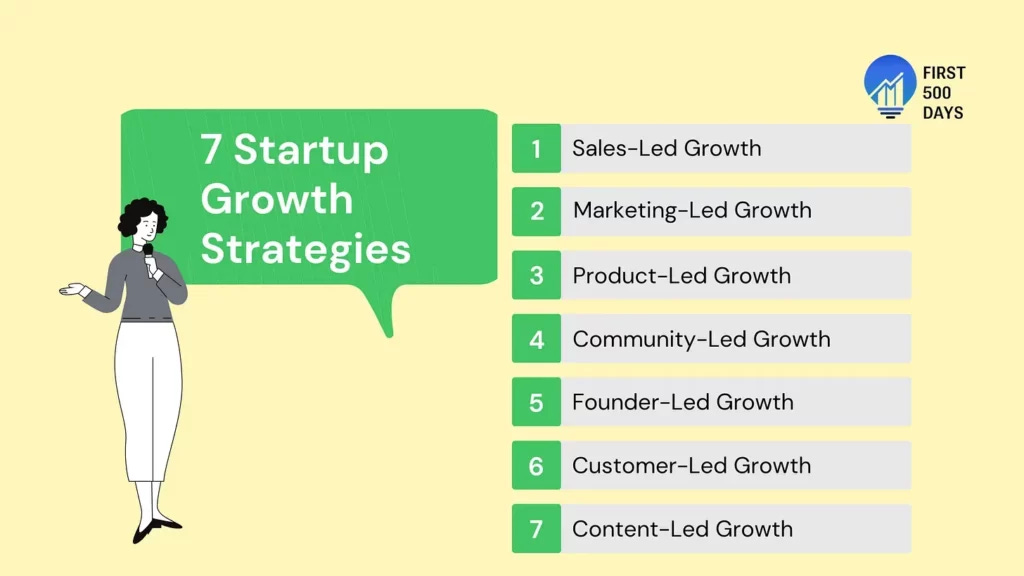Startup Growth is one of the biggest challenge startups face during their journey. Lets discuss growth strategies in this article.
Hey, welcome to today’s read.
Today we will going to discuss-
- Content-Led Growth
- Sales-Led Growth
- Marketing-Led Growth
- Product-Led Growth
- Community-Led Growth
- Founder-Led Growth
- Customer-Led Growth
1. Sales-Led Growth
Sales team acquires/converts customers with outbound efforts
Ex: Palantir Technologies, Salesforce, etc.
Pros
- Complex products that require custom integrations
- Higher ACV (Annual Contract Value), lower-churn enterprise customers
Cons
- Longer sales-cycles, higher barrier to entry
- Requires talented (expensive!) sales teams
2. Marketing-Led Growth
Acquisition driven by ads, gated content, blogs, ebooks, videos, newsletters, SEO
Pros
- Can quickly fill ToFu (Top-of-Funnel)
- Cheaper than sales-led
Cons
- Over-emphasis on acquisition at-all-costs can result in higher downstream churn
- Social channels are becoming more expensive
3. Product-Led Growth
Customer activation requires NO human touch-points (free-trial or freemium)
Pros
- Better user experience drives “bottoms-up” organic growth
- Requires no sales team to get started
Cons
- Hard to move users from free to paid
- Requires exponentially more users due to lower ACV
4. Community-Led Growth
Distribution, adoption, customer support driven by groups of passionate customers
Pros
- Great for “horizontal” products with divergent use-cases
- Member-mentality = higher customer retention
Cons
- Fostering sustainable, organic communities is extremely difficult
- Hard to apply with certain types of products
5. Founder-Led Growth
Founder’s personality, vision, & social presence drives acquisition
Pros
- Thought leadership creates high degree of trust
- Long-term audience-building solves for early distribution challenges
Cons
- Risky—the company’s success is inextricably tied to a single person
- Requires significant time investment from the founder
6. Customer-Led Growth
Strategy driven by customer insights & measured w/ customer-centric KPIs (rather than business-centric)
Ex: The Walt Disney Company, Nordstrom
Pros
- High customer retention & satisfaction
- Growing community of CLG practitioner’s like Forget The Funnel, Bob Moesta
Cons
- In-depth qualitative & quantitive customer research can take a long time & cost $$
- What’s best for the customer isn’t always best for the business
7. Content-Led Growth
Similar to marketing-led but deeper focus on no-click content (valuable content with no CTAs)
Pros
- Like founder-led, greatly increases trust
- Freely-given value creates deep loyalty (before prospects are even customers!)
Cons
- Consistently creating valuable content requires tons of dedicated time & energy
- Hard-to-track attribution can deter companies from sticking with it
Thanks for the read
What Next?
If you liked this content, follow us on LinkedIn, Twitter, Instagram, and Youtube and share it with your friends.
You are welcome to join the Founders’ Community. The only community where you can network and learn from peer founders.
If you are building your startup, don’t forget to check out our upcoming Startup Cohort.
If you have any suggestions, I would be happy to listen here.


